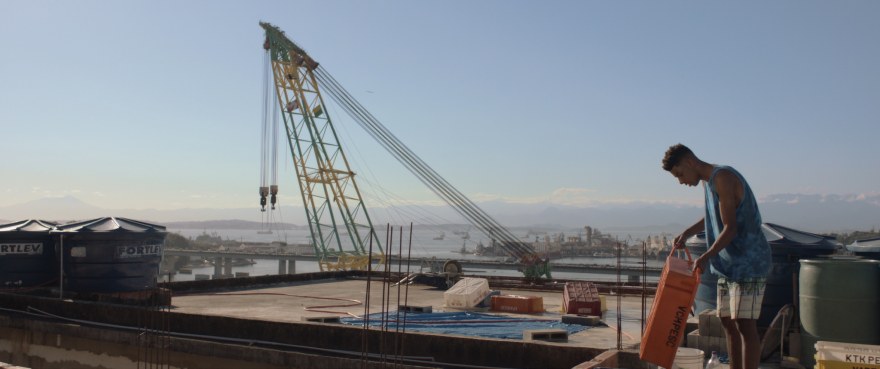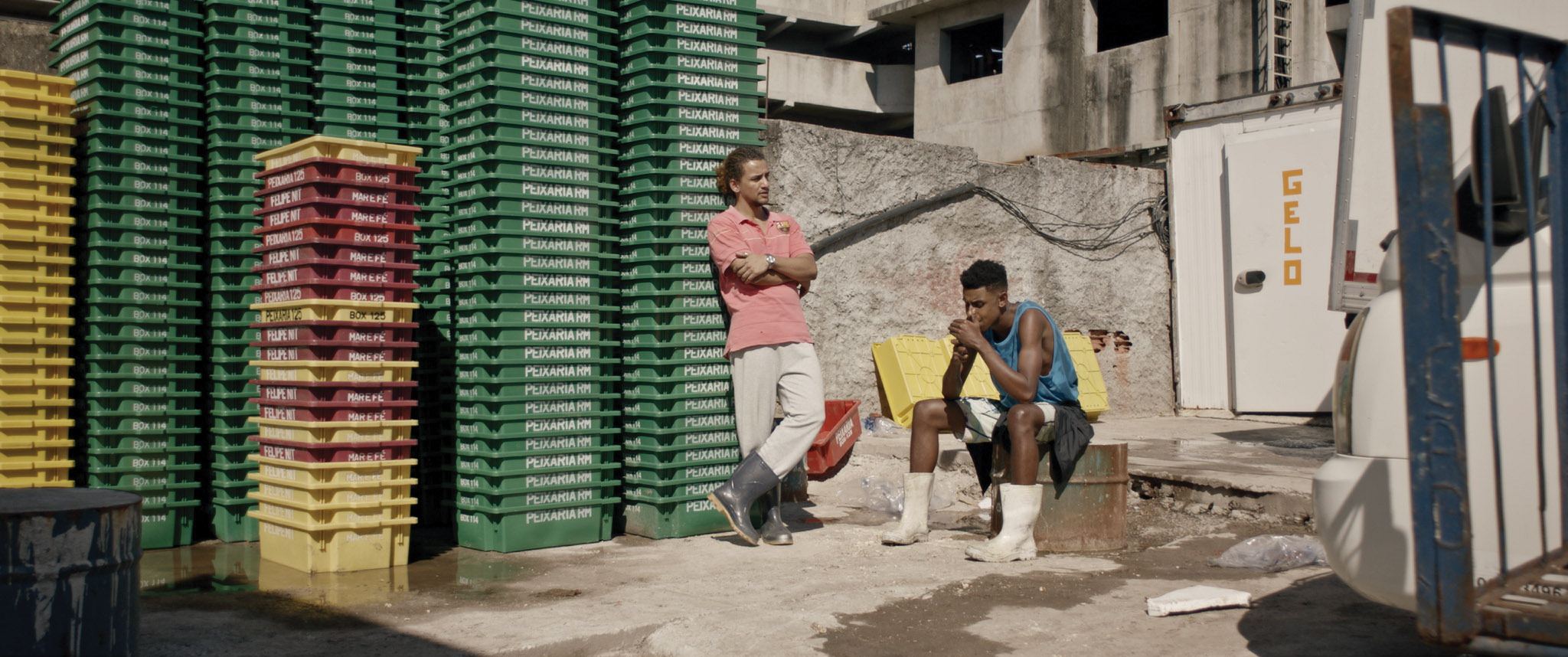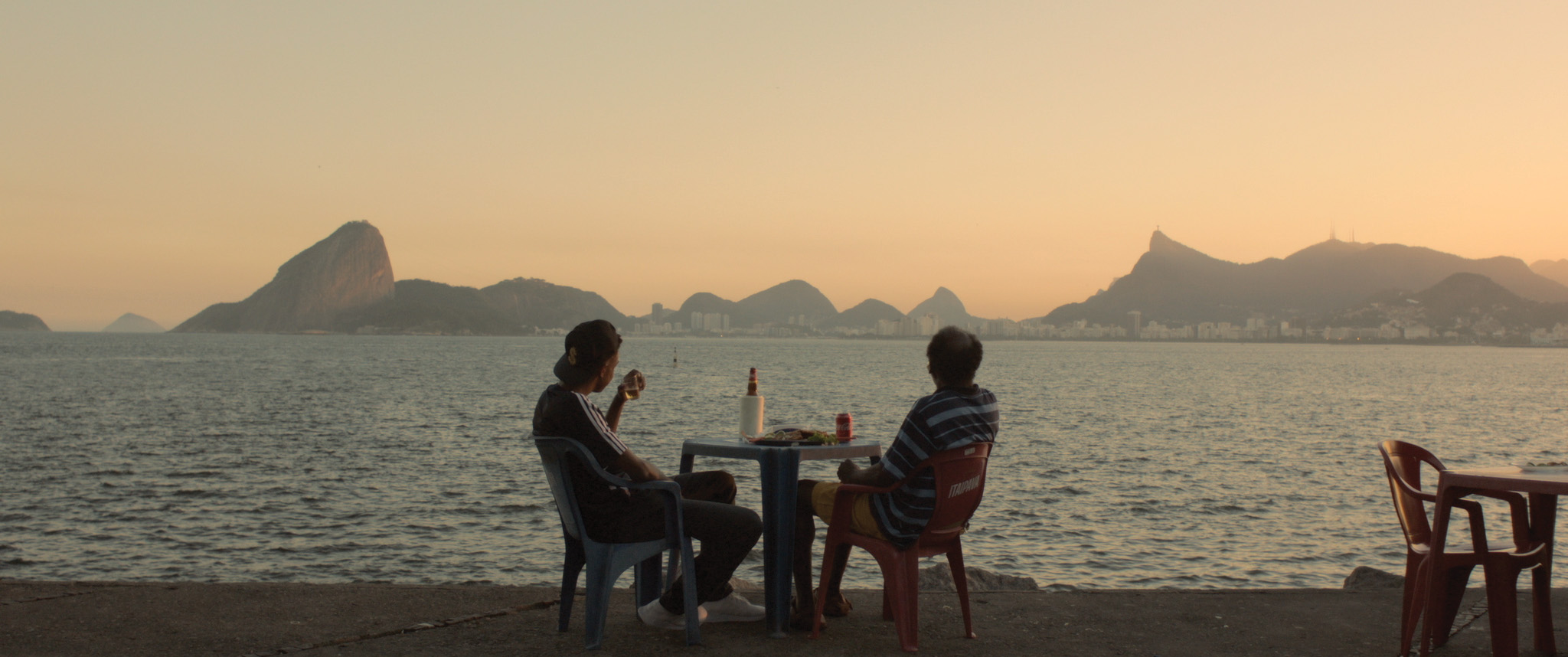Lunch with Portugal Pequeno [Little Portugal]
Interview with Victor Quintanilha, director of Portugal Pequeno [Little Portugal]
To somebody who hasn’t seen Portugal Pequeno, how would you introduce it?
Portugal Pequeno is a film, in essence, about the passage to adulthood. A story about a young man who works as a fisherman with his father and dreams of being a famous Brazilian funk singer. Through the routine of this character, several layers are subtly revealed, composing a series of elements that surround and influence the character in this important moment of his life.
How did you decide on this topic and protagonist to make a film about?
I am from São Gonçalo, a neighboring city of Rio de Janeiro, and I used to cross daily the Rio-Niterói bridge (the one that can be seen in the film, by the way) to go to PUC-Rio where I studied cinema. From this bridge I always looked with great interest at this place known as Portugal Pequeno, with its tiny fishing boats surrounded by the huge ships and oil platforms. Since then, I had the desire to tell a story in this community that offered so many narrative elements to be worked on. So I started to create this character: a young fisherman whose dream is to be a famous funk singer. With this initial conflict, the other elements emerged naturally thanks to all the contrasts that the context itself offered. I was quite clear that I wanted to tell this story in a light way, not victimizing the characters and to present, in a direct and simple way, the challenges of a young black artist in this phase of transition to adulthood, where important choices about the future are made.
What were the challenges and benefits of working on the film together?
Throughout the production process of this film I was able to gather great friends who studied with me at EICTV in Cuba, so we had a very intimate and pleasant atmosphere. The whole crew added an incredible energy into the set, everyone put a lot of love and dedication into the work and I believe that this can be felt in the result of the film. But definitely the most vital contribution to the film was the unconditional reception of Morro da Penha, where we shot the film. All residents were amazing and participated actively, creating a beautiful bond with the whole crew. I believe that there lies one of the great powers of cinema, which is bringing people together. I’m really looking forward to finally being able to screen the film there after the pandemic with everyone gathered. I think the biggest challenge was filming the first scene of the film due to the amount of extras and elements to be controlled, at times it was pure chaos and I even thought that we would not be able to finish it.
What was the experience of casting and directing your cast like?
Our first idea was to use non-actors, but the reality of our production did not allow us to devote so much time and energy in the search for these candidates and then in the preparation of those selected. So we opened a call and did an audition with more than 60 candidates. It was a difficult process but with a lot of learning and I was very happy to meet so many talented young people. In this process we chose João Vitor Nascimento, an incredible actor from Vidigal’s group “Nós do Morro”. He had the exact energy we were looking for, with innocent and hopeful eyes. For the father’s character our first and only option was Wilson Rabelo. I got to know his work when I did the dialogue editing of the film Bacurau. Wilson brought all his experience and intelligence to the film. He’s a great actor and having the chance to work with him was wonderful. Having these two actors gave me the security I needed to work on each scene in the most minute details possible. After each rehearsal we had a conversation where we shared our impressions in order to improve the scenes and also our connection. So when we finally went to set we were all vibrating on the same frequency and our communication was really efficient.
Do you have any further plans for the film?
It’s far beyond what I expected to have our film premiering at 2021 Clermont Ferrand International Short Film Festival, but I would very much like the film, in addition to participating in festivals, to also be screened on television and to be watched by as many viewers as possible, especially the young audience close to Jonathan’s age group.
What do you think the future holds for short films?
I believe that the current pandemic has shown us a new path for film festivals, especially for screening short films. The online versions of festivals present themselves as a new possibility that can reach a much larger audience, increasing and democratizing access to culture. Perhaps this new reality will further stimulate the production of short films.
If we were to go back into lockdown, what cultural delights would you recommend to alleviate our boredom?
During the quarantine I was able to watch many films and series and I definitely recommend the series I May Destroy You, I think everyone should watch it. The way the characters are built and conflicts are developed is magnificent. It is amazing how the series deals with the different types of abuse that exist even in less obvious actions and places. And for those who are interested in knowing more about Rio de Janeiro’s funk I recommend artists like Iasmin Turbininha, Kevin O Chris, Mc Rebecca, Ludmilla, WC no Beat and Mc Cabelinho, but there are many others with the perfect music to liven up any party.
Portugal Pequeno [Little Portugal] is part of International Competition I14.










